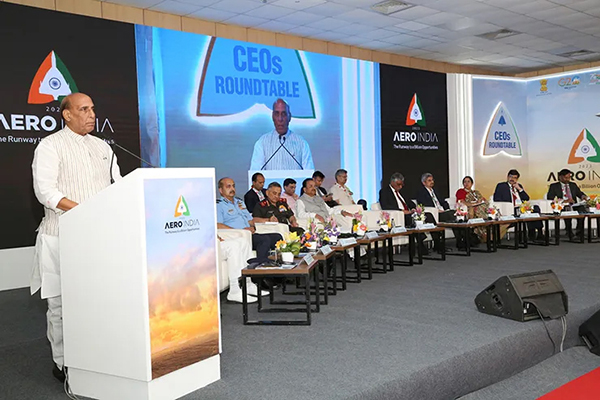Union defence minister Rajnath Singh indicated during Aero India show that India could bring more weapons and systems under an import ban, and manufacture them in the country to give a new push to self-reliance in the defence sector, with the latest ‘positive indigenisation list’ set to come on the back of four similar lists that have barred the import of 411 military items during the last 30 months.
Singh said, “I cannot rule out the possibility of a new positive indigenisation list (coming out soon), given India’s focus on self-reliance in the defence manufacturing sector.”
The upcoming fifth ‘positive indigenisation list’ will be a pivotal development in India’s quest for self-reliance in defence and will also boost the country’s status as an exporter of military hardware. The first four lists, announced in August 2020, May 2021, April 2022 and October 2022, impose a phased import ban on weapons that are planned to be indigenised over the next five to six years. The fourth list was announced by Modi during the opening ceremony of DefExpo-2022 at Gandhinagar in Gujarat last October.
The lists cover a raft of weapons and systems, including artillery guns, missile destroyers, ship-borne cruise missiles, light combat aircraft, light transport aircraft, long-range land-attack cruise missiles, basic trainer aircraft, multi-barrel rocket launchers, a variety of helicopters, assault rifles, sniper rifles, mini-unmanned aerial vehicles, next-generation corvettes, and airborne early warning and control (AEW&C) systems.
Military hardware sought to be developed locally also ranges from light tanks, naval utility helicopters and mounted artillery gun systems to medium altitude long endurance unmanned aerial vehicles, missiles and loitering munitions. Import substitution of ammunition, which is a recurring requirement, has been given special emphasis in the previous lists.
The possibility of the new list comes at a time when India has sharpened its focus on getting a toehold in foreign markets, set a target of achieving defence exports worth $5 billion by 2025, and taken a raft of policy measures to boost the indigenous defence manufacturing sector.
Military hardware being exported by India includes missiles, the advanced light helicopter, offshore patrol vessels, personal protective gear, surveillance systems and a variety of radars. The hardware that holds export potential includes the light combat aircraft, Astra beyond-visual-range air-to-air missile, Akash surface-to-air missile system, tanks, sonars and radars. India currently exports military hardware to 84 countries, with the number likely to increase in the coming years, the officials said.
“A strong and self-reliant defence sector will play a pivotal role in helping India emerge as one of the top three world economies in the times to come. Achievements in the defence sector provide spin-off benefits to the Indian economy. The technologies developed in the field are equally useful for civilian purposes,” Singh said.


















